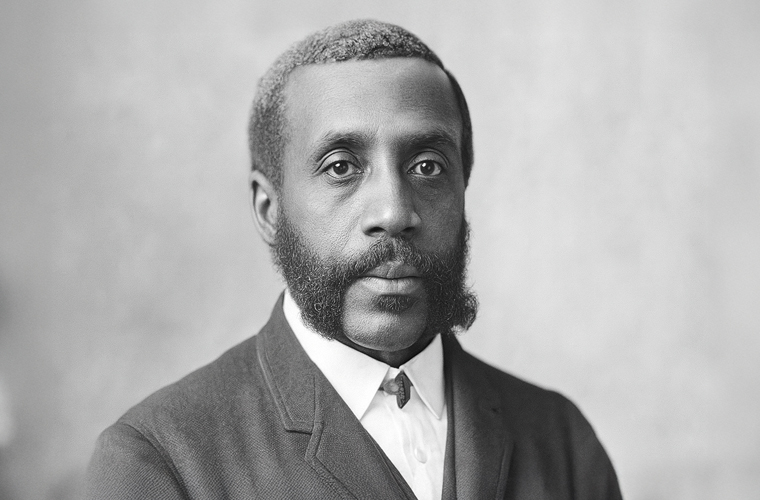George Putnam Riley was born in 1833 in Boston, Massachusetts, into a family with deep historical ties and a commitment to social justice. His grandfather served in the Revolutionary War under General Israel Putnam, a connection likely reflected in Riley’s middle name. His father, William Riley, ran a successful clothing business in Boston, providing a stable foundation for the family. His mother, Elizabeth Riley, was a prominent abolitionist whose activism profoundly influenced young George. She hoped he would pursue higher education, but racial barriers prevented him from attending college, a stark reminder of the systemic discrimination of the era. In Boston, Riley immersed himself in the abolitionist movement. He actively participated in the John Brown Mass Meetings, gatherings that rallied support for the radical abolitionist’s cause. Additionally, he worked for Benjamin Butler, a prominent lawyer who later became a Union general during the Civil War. These experiences shaped Riley’s worldview, instilling in him a passion for equality and justice that he carried throughout his life.
In the 1860s, drawn by opportunity and the promise of a new frontier, Riley left Boston for the West Coast. He first settled in San Francisco, California, where he established himself as a barber—a common trade for African American men at the time, offering both economic stability and a platform for community engagement. Seeking further prospects, he later moved to Portland, Oregon, where he continued his trade while becoming a respected figure in local business and political circles. Riley’s adventurous spirit led him to participate in the California Gold Rush and the gold rushes in the Canadian Northwest Territory. These ventures, though risky, showcased his willingness to seize opportunities in uncharted territories, a trait that would define his later contributions to the Pacific Northwest.
In 1869, Riley co-founded the Workingmen’s Joint Stock Association (WJSA) in Portland, Oregon, a pioneering cooperative of 15 members: 11 African American men, two African American women, and one white man. The WJSA aimed to pool resources to invest in real estate, a bold move for a group facing racial and economic challenges. As president, Riley led the initiative with vision and determination. Tasked with finding suitable land, Riley traveled to Washington Territory and, in August 1869, orchestrated the purchase of the eastern half of the 20-acre Hanford Donation Claim in Seattle for $2,000. This acquisition, named Riley’s Addition to South Seattle, encompassed four blocks in what is now the Beacon Hill neighborhood, bordered by South Forest and South Lander Streets, between 19th and 21st Avenues South. This purchase marked a significant achievement, providing African Americans with a foothold in Seattle’s emerging urban landscape.
Riley’s influence extended to Tacoma, Washington, where he and his WJSA associates purchased 67 acres of land in 1869. Legally designated the Alliance Addition, the tract was derogatorily referred to as the “Nigger Tract” by some, reflecting the pervasive racism of the time. Remarkably, Riley was the only WJSA member to visit Tacoma, yet this acquisition laid the foundation for the city’s African American community. The Alliance Addition became the heart of Tacoma’s Hilltop neighborhood, a vibrant center of Black culture and community life that endures today. Riley was a towering figure in the political landscape of the Pacific Northwest. As Chairman and President of the Colored Citizens of Portland, he advocated for the rights and representation of African Americans in a region where they were a small minority. His relationships with all of Washington Territory’s governors underscored his influence and ability to navigate elite circles despite racial prejudice.
A gifted public speaker, Riley captivated audiences with orations that drew crowds of hundreds. He spoke eloquently on political, historical, and social issues, earning praise as a “natural orator” whose abilities rivaled the most accomplished speakers of his time. The Oregon Statesman lauded his talent, noting that only racial prejudice prevented him from achieving a “high position” in society. His speeches not only inspired but also challenged the status quo, amplifying the voices of African Americans in the region.
George Putnam Riley passed away in Tacoma in 1905 at the age of 72, leaving behind a legacy of resilience, leadership, and community-building. His contributions to the Pacific Northwest were profound, from founding African American communities in Seattle and Tacoma to advocating for civil rights in an era of entrenched discrimination.
In 2005, a century after his death, Riley’s legacy was honored when a Black-led real estate development group in Seattle named itself the George Riley Group. The organization built homes near Riley’s Addition, paying tribute to his pioneering efforts in fostering African American land ownership and community development. Today, neighborhoods like Beacon Hill and Hilltop stand as testaments to Riley’s vision, embodying the enduring impact of his work in creating spaces where African Americans could thrive.
Riley’s life serves as a powerful reminder of the contributions of African American pioneers in shaping the Pacific Northwest. His story—marked by courage, enterprise, and eloquence—continues to inspire efforts toward equality and justice in the region and beyond.

